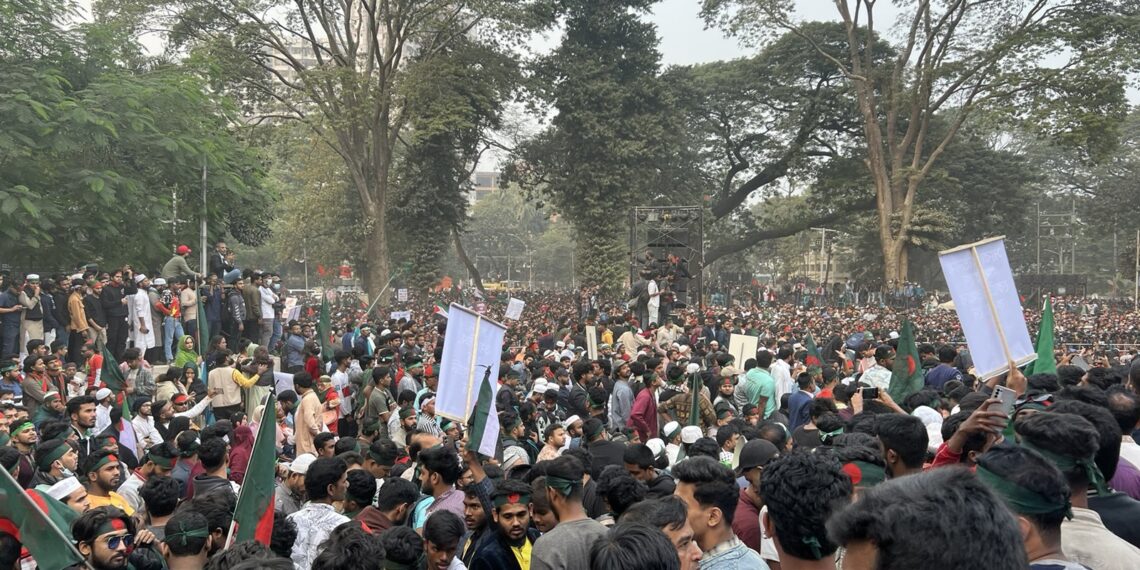DHAKA: Bangladesh’s interim government has announced plans to draft the “Proclamation of the July Uprising,” a declaration aimed at consolidating national unity and reform, following its distancing from a similar declaration proposed by student movements.
These movements played a crucial role in toppling Prime Minister Sheikh Hasina’s government earlier this year.
In a press briefing late on Monday night, Shafiqul Alam, Press Secretary to Chief Adviser Muhammad Yunus, revealed that the government would prepare the proclamation within a few days, with input from various stakeholders, including students, political parties, and civil groups.
“The proclamation will reflect the views of all participants and will be presented to the nation,” Alam stated.
ALSO READ: 17 Christian Tripuri homes burned in Bangladesh: US and EU intervention sought
The announcement came after the student-led Anti-Discrimination Students Movement, which spearheaded the August 5 uprising, proposed its own version of the proclamation.
This declaration aimed to capture the spirit of the July uprising, which had pushed for political change, and to symbolise the collective desire for anti-fascist action and state reform.
Alam explained that the government’s proclamation would aim to strengthen unity and promote reforms that arose from the popular movement.
The government’s decision follows a growing desire among many sectors of society to address grievances related to governance, fascism, and state institutions.
The proposed proclamation initially planned by the students was set to be announced at Dhaka’s Central Shaheed Minar, the symbolic site of Bangladesh’s 1971 Liberation War.
ALSO READ: India raises alarm over targeted violence against Hindus and other minorities in Bangladesh
However, following the government’s announcement, the student leaders altered their course, calling for a “march for unity” instead of the proclamation.
Their platform leader, Hasnat Abdullah, explained that the declaration would criticise the legacy of the Mujibist 1972 constitution, blaming it for stoking internal conflicts, including tensions with India.
Abdullah emphasised that the proclamation would reject the 1972 constitution, terming it as a product of fascism and stating that it no longer represented the aspirations of the people.
Sarjis Alam, another prominent student leader, echoed these sentiments, stressing that the proclamation would reflect the hopes and dreams of those who supported the anti-fascist movement.
The July uprising and the subsequent protests were sparked by the student-led Anti-Discrimination Students Movement, which emerged as a major political force.
These students, alongside other factions like the National Citizens’ Committee, voiced dissatisfaction with the Awami League’s rule and called for a constitutional revision.
The 1972 constitution, drafted after the nation’s independence from Pakistan, has long been a point of contention in Bangladesh’s political discourse.
The interim government, led by Yunus, has distanced itself from the student-led proclamation, suggesting that it is a “private initiative” and not connected to official government policy.
ALSO READ: Bangladesh seeks Sheikh Hasina’s extradition from India amid rising tensions
While the Awami League has largely remained out of the public eye since being ousted, with many of its leaders arrested or in hiding, other political entities, including the BNP, have criticised the student movements’ proposed actions.
Mirza Abbas, a senior member of the BNP, criticised the student leaders for calling for the burial of the 1972 constitution, stating that the constitution was drafted with the sacrifice of three million lives during the Liberation War.
He warned that such rhetoric echoed fascist tendencies, echoing the language used by authoritarian regimes in history.
As tensions continue to simmer between the interim government, student movements, and various political groups, the situation remains fluid, with widespread debate over the future of Bangladesh’s political system and constitutional framework.















